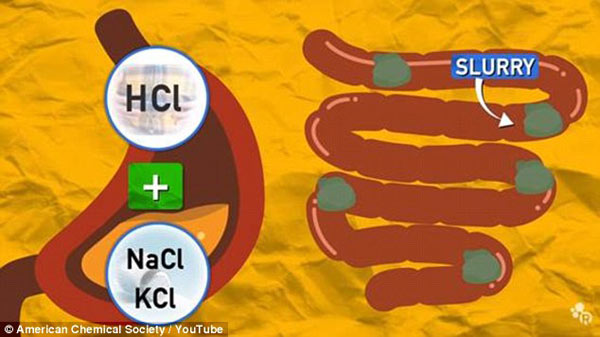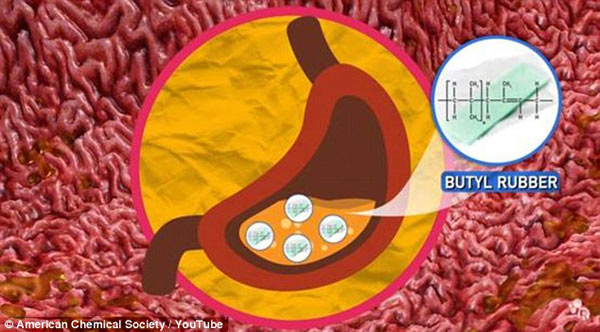當(dāng)前位置: Language Tips> 雙語新聞
Have you ever swallowed chewing gum? Don’t worry, it's not still inside you as scientists bust the playground myth
分享到

It is a classic playground scare story - if you swallow chewing gum it will stay in your digestive system for seven years.
有個(gè)經(jīng)典的大人拿來嚇唬小孩的謊言——如果你吞下了口香糖,它將在你的消化系統(tǒng)里停留七年。
But according to scientists at the American Chemical Society, the tale is myth as chewing gum is no more harmful than the rest of the food that passes through our digestive system.
但是據(jù)美國化學(xué)學(xué)會(huì)的科學(xué)家稱,這并非事實(shí),其實(shí)嚼過的口香糖和其他經(jīng)過我們腸胃的食物一樣,沒有什么危害。
It says while gum is harder to digest, it tends to pass harmlessly through our guts much like other foods.
研究發(fā)現(xiàn),雖然口香糖很難消化,但是它和其它食物一樣,都能從腸道無害排出。
By examining how regular foods are processed through our bodies, a video from The American Chemical Society reveals what really happens when you swallow chewing gum.
通過研究我們的身體如何消化吸收普通食物,美國化學(xué)學(xué)會(huì)制作了一段視頻,向大家展示了當(dāng)你吞下口香糖,腸胃里會(huì)發(fā)生什么情況。
When we eat something - whether it be normal foods or chewing gum - it goes through three main phases in our bodies.
當(dāng)我們進(jìn)食時(shí)——不管是正常的食物還是口香糖——都會(huì)在消化道內(nèi)經(jīng)歷三個(gè)主要階段:
The first of these phases is the 'mechanical' phase (otherwise known as chewing).
第一階段是“機(jī)械”階段(也就是咀嚼)。
As the Reactions video explains, with normal foods 'your teeth and tongue work together to crush the food you eat into tiny bits.'
正如這個(gè)“反應(yīng)視頻”所解釋的那樣,進(jìn)食普通食物時(shí),你的牙齒和舌頭協(xié)同工作,將你吃進(jìn)去的食物嚼成小小的碎末。
Munching your food then triggers muscle movements which move the food through your digestive tract down to your stomach, where muscles 'churn your chewed up food with digestive juices.'
用力咀嚼食物帶動(dòng)肌肉運(yùn)動(dòng),這會(huì)把食物通過食道運(yùn)送到胃里,胃部肌肉“用胃酸攪拌你咀嚼過的食物”。
The second phase involves enzymes - biological catalysts which speed up chemical reactions - which are found in your saliva, stomach juices and intestines.
第二階段涉及到酶,這是一種可以加速化學(xué)反應(yīng)的生物催化劑。這些消化酶主要存在于唾液、胃液和小腸液中。
Enzymes 'kick start' the reactions to break down the food into its constituent parts, whether they are fats from foods such as cheese, carbohydrates from food such as pasta, or proteins from meat or nuts.
酶能“啟動(dòng)”這些反應(yīng),將食物分解為一些基本成分,比如從奶酪里分解出脂肪,從意大利面里分解出碳水化合物,或者從肉類、堅(jiān)果類分解出蛋白質(zhì)。
These constituent parts are the nutrients your body can use.
這些成分就是人體可以利用的營養(yǎng)物質(zhì)。

Stomach acid, which is made up of hydrochloric acid and salts, leads the third phase of digestion.
第三個(gè)消化階段由胃酸引導(dǎo)。胃酸由鹽酸和鹽分組成。
The video explains 'this harsh brew dissolves chewed food into a slurry so your intestines can handle it'.
視頻解釋說,“這種非常厲害的消化液可以把咀嚼過的食物分解為泥漿狀,這樣你的腸道就可以處理它們了。”
After this point, whatever remains goes straight down the toilet.
經(jīng)過此步之后,剩下的東西就以糞便形式被排出體外。
How does your body process chewing gum?
那么身體又是如何處理口香糖的呢?
As you'll have probably noticed, the main difference when processing chewing gum is the fact that during the 'mechanical phase' you don't crush the chewing gum down into tiny bits - that would somewhat defeat the purpose of chewing gum.
可能你已經(jīng)注意到了,處理口香糖,和其他食物最大的不同就在“機(jī)械”階段,口香糖不能被分解成小塊——如果真的嚼碎了,一定程度上就沒有達(dá)到吃口香糖的目的。
Instead, if you swallow the gum, it will go down in one big wad before it enters phase two - the enzyme phase.
因此,如果你將它吞下去了,它就會(huì)整個(gè)一大團(tuán)直接進(jìn)入第二階段——酶消化階段。
Most of the molecules in gum are carbohydrates, oils and alcohols. As with any other food, on their own these molecules are easily broken down.
口香糖里的主要成分是碳水化合物、油類和醇類。與其他食物一樣,僅僅是這些分子的話,它們很容易分解。
However, the video explains 'your body doesn't have an enzyme for the rubber polymers, regardless of whether they're natural or synthetic' so the gum passes through to Phase three. While stomach acid is strong, it still can't dissolve the rubber polymers in the chewing gum.
然而,視頻解釋說,“你的身體里沒有能分解橡膠聚合物的酶類,不管是天然的還是合成的。”所以,口香糖來到了第三個(gè)階段。盡管胃酸很強(qiáng)大,但它仍然不能分解口香糖中的橡膠聚合物。
In fact, the video explains 'rubbers are very good at shielding from acids in general - that's one reason we wear rubber gloves for protection.'
事實(shí)上,視頻解釋說,“一般來說,橡膠的防酸特性非常好,因此我們戴橡膠手套進(jìn)行保護(hù)”。
So, while part of your gum does survive digestion, it does not remain in your stomach for seven years.
所以,盡管口香糖的部分物質(zhì)確實(shí)在消化系統(tǒng)中幸存下來,但它卻不會(huì)在腸道中呆上7年。
The video concludes 'even though you don't break down the rubber polymers, your body has no problem moving that lump of gum through your digestive system and out the other end within a day or two.'
視頻最后總結(jié)說,“盡管橡膠聚合物沒能被分解,但你的身體也完全可以把這一團(tuán)口香糖清除出消化系統(tǒng),‘這頭進(jìn)那頭出’,只要一兩天時(shí)間。”
來源:英國每日郵報(bào)
翻譯&編審:yaning
上一篇 : 神奇墨水瞬間消除永久性紋身
下一篇 : 兒童節(jié)陪孩子一起看十部電影
分享到
關(guān)注和訂閱


關(guān)于我們 | 聯(lián)系方式 | 招聘信息
電話:8610-84883645
傳真:8610-84883500
Email: languagetips@chinadaily.com.cn